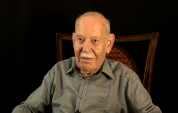4:16 | As he climbed the rope ladder to get on the ship for Europe, Bob Welch saw the name on the side of the ship, the Queen Mary. He was impressed and that continued on board because the ship had not been converted to a troop ship. It was luxury all the way. From their barracks in England, the artillery battalion got its first orders and headed to North Africa.

There were plenty of problems in North Africa for Bob Welch and his artillery unit. First, he was nearly hit with a shell that took out a communications man and then all the officers were captured on a reconnaissance party. He then had to suffer through the British troops who stopped fighting at four in the afternoon for tea.
The previous ammunition officer had been beheaded by piano wire stretched across a road, but Bob Welch jumped at the chance to fill the position servicing the 155mm howitzer batteries. As they dueled Rommel's tanks in Tunis, suddenly the Germans withdrew, signalling the end of their Africa campaign.
Bob Welch was proud of his service battery, who won a close order drill competition despite hardly ever drilling because they were too busy. That was soon forgotten as they loaded their artillery unit onto landing craft for the Normandy invasion. After the British captain refused to move his boat any closer to the beach, Welch improvised and got his men ashore with no losses.
As they waited to move into Germany, Bob Welch went to the rear to load up with ammunition for the artillery batteries, but there was a problem. Gen. Patton had taken all the available ammunition so everyone else had to wait three weeks before proceeding. After they were on the move, the entire battalion took a wrong turn and headed straight for the enemy encampment.
They were getting a much needed break, but then the word came, "Don't get off the trucks." The Battle of the Bulge had broken out and Bob Welch's artillery unit rushed its howitzers back to the action. After prevailing there, they pushed on to Czechoslovakia where he did a little shopping.